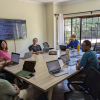Upgrading Peacekeeping - 5 Essential Actions
Technological progress, liberalization and the end of the Cold War have significantly altered existing transnational conflict drivers, as well as created new ones. A veritable process of fusion has taken place in which modern-day possibilities have irrevocably meshed with age-old legacies and practices, with the result that many of today’s conflicts cannot be sustainably resolved without taking account of transnational conflict drivers. Yet, the international community’s peace-building toolkit is not well equipped to do so.
Consequently, and due to the securityfocused nature of the UN, larger missions will continue to prioritize governance and security with a focus on restoring the government capability of the host-state – despite all the risks this entails. The challenge is to remain within this paradigm while shifting it slightly towards the logic and economy of 21st century conflict.
Five actions could help to accomplish this:
Short-term
1. Ensure every new peacekeeping mission has an adequate and dedicated intelligence capability
2. Short-term: Ensure every new mission has a dedicated strategy unit
3. Focus mission capabilities on insulating domestic politics from transnational influences
Medium term
4. Provide every mission with at least one regional envoy
Long term
5. Explore options for establishing regional mandates







Login or register for free to get all access to our network publications. Members can also connect and discuss with other members. Participate in our network.